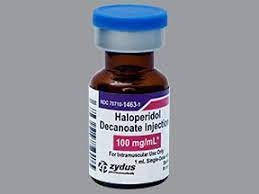A nurse is preparing to administer haloperidol 75 mg IM per week. Available is haloperidol decanoate 100mg/ml for injection. How many ml should the nurse administer per dose? (Round the answer to the nearest hundredth. Use a leading zero if it applies.
The Correct Answer is ["0.75"]
To calculate the volume (ml) of haloperidol decanoate needed for a dose of 75 mg, you can use the following formula:
Volume (ml) = Dose (mg) / Concentration (mg/ml)
Given:
Dose = 75 mg
Concentration = 100 mg/ml
Plugging in the values:
Volume (ml) = 75 mg / 100 mg/ml
Volume (ml) = 0.75 ml
Rounding to the nearest hundredth:
Volume (ml) = 0.75 ml
So, the nurse should administer 0.75 ml of haloperidol decanoate for the dose of 75 mg.

Nursing Test Bank
Naxlex Comprehensive Predictor Exams
Related Questions
Correct Answer is A
Explanation
A. Schedule regular weigh-in times: Monitoring the client's weight on a regular schedule is important in managing anorexia nervosa. It helps track progress and any potential complications related to weight loss.
B. Allow the client to eat at any time: For individuals with anorexia nervosa, there is typically a structured meal plan that is carefully monitored by healthcare professionals. Allowing the client to eat at any time might disrupt the planned nutritional intake.
C. Provide privacy when friends visit: Privacy is important, but it should be balanced with ensuring the client's safety and adherence to the treatment plan. Visitors might need to be supervised to prevent any behaviors that could exacerbate the disorder.
D. Compliment the client for weight gain: While support and encouragement are important, complimenting a client for weight gain might inadvertently reinforce a focus on body image and reinforce disordered eating behavior. It's crucial to provide positive reinforcement for adherence to the treatment plan and progress in recovery, rather than emphasizing weight changes.
Correct Answer is ["A","B","C","D"]
Explanation
A. Lithium: Lithium is a mood stabilizer commonly used in the treatment of bipolar disorder. It helps to control mood swings and prevent the recurrence of manic and depressive episodes.
B. Carbamazepine: Carbamazepine is an anticonvulsant medication that has been found effective in managing mood swings in bipolar disorder. It can help stabilize mood and prevent manic episodes.
C. Valproate (Valproic acid or Divalproex sodium): Valproate is another anticonvulsant medication that is used as a mood stabilizer in bipolar disorder. It can help control manic and mixed episodes.
The following options are not used to treat bipolar disorder:
D. Paroxetine: SSRIs, including paroxetine, carry a risk of inducing mania or hypomania in individuals with bipolar disorder. This risk is why these medications are usually avoided or used cautiously, always in conjunction with a mood stabilizer like lithium, valproate, or atypical antipsychotics. Before initiating paroxetine, it’s crucial that the client is stabilized with a mood stabilizer to minimize the risk of mood switching (i.e., moving from depression to mania or hypomania).
E. Donepezil: Donepezil is a medication used to treat Alzheimer's disease and other forms of dementia. It is not used to treat bipolar disorder.
Whether you are a student looking to ace your exams or a practicing nurse seeking to enhance your expertise , our nursing education contents will empower you with the confidence and competence to make a difference in the lives of patients and become a respected leader in the healthcare field.
Visit Naxlex, invest in your future and unlock endless possibilities with our unparalleled nursing education contents today
Report Wrong Answer on the Current Question
Do you disagree with the answer? If yes, what is your expected answer? Explain.
Kindly be descriptive with the issue you are facing.
